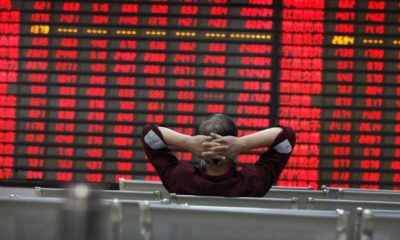Investment
Investment 101 According To Warren Buffett
The Sage of Omaha
Over the years, Warren Buffett has become known for the strength of his investment portfolio, and his skill at growing it.
Under his stewardship, his holding company, Berkshire Hathaway, has grown to become the fifth largest public company in the world.
Buffett himself has become known as “The Sage of Omaha” due to the wisdom of his investments and the success of his holdings.
So how does he do it?
Playing the long game
Buffett is perhaps best known for the long-term vision of his investing style.
He invests in companies for the long-term, keeping hold of stocks rather than trading regularly.
The success of this is two-fold.
Firstly, it avoids the tax that those investors who trade in and out have to pay.
Secondly, his long-term faith in the company can help the company grow, increasing the size of his investment.
He’s on record as saying he doesn’t believe in buying and selling stocks on a daily basis.
[ms_divider style=”normal” align=”left” width=”100%” margin_top=”30″ margin_bottom=”30″ border_size=”5″ border_color=”#f2f2f2″ icon=”” class=”” id=””][/ms_divider]
[ms_featurebox style=”4″ title_font_size=”18″ title_color=”#2b2b2b” icon_circle=”no” icon_size=”46″ title=”Recommended Link” icon=”” alignment=”left” icon_animation_type=”” icon_color=”” icon_background_color=”” icon_border_color=”” icon_border_width=”0″ flip_icon=”none” spinning_icon=”no” icon_image=”” icon_image_width=”0″ icon_image_height=”” link_url=”https://offers.thecapitalist.com/p/warrenbuffet/index” link_target=”_blank” link_text=”Click Here To Find Out What It Said…” link_color=”#4885bf” content_color=”” content_box_background_color=”” class=”” id=””]Warren Buffett Just Told His Heirs What He Wants them To Do With His Fortune When He Dies. [/ms_featurebox]
[ms_divider style=”normal” align=”left” width=”100%” margin_top=”30″ margin_bottom=”30″ border_size=”5″ border_color=”#f2f2f2″ icon=”” class=”” id=””][/ms_divider]
It’s a business.
Many investors regard stocks as something simply to be traded.
Buffett treats his stocks as what they are: parts of a business.
He considers himself, as a stockholder, to be a part owner of the business in which he’s invested.
The strength of this approach is that it makes it likelier that an investor will be more focused in analyzing how well that business will do in the long run.
He does his deals in person, with a handshake. He’s aware he’s dealing with people, not numbers.
Due diligence
Buffett doesn’t simply look at what stocks are doing.
He studies the company as a whole that he’s going to invest in, and then only invests if he’s confident that it’s well-run, fundamentally sound, and likely to grow over the years ahead.
This is a low-risk strategy.
But one that in the long term, yields highs rewards.
He knows the companies he’s dealing with inside-out.
Keep emotion out of it
Successful investors have a rational and analytical approach to their investing.
Buffett is the same.
He concentrates on the fundamentals of a business and keeps an eye on hard economic news, rather than mere speculation.
Stock markets rise and fall, but business continues.
An aspect of Buffett’s investment style is not panicking when the stock market is in turmoil. Trust in the business you’ve invested in.
The key points of his investment style
- Think long term
- Regard stocks as a business, not a commodity
- Do your homework on your investments.
- Think rationally, stay calm
Keeping true to your beliefs
When the market looks bad, many investors follow the herd and dump stocks.
All this does is make the situation worse.
What Buffett realizes is that this is the time to increase your equity, not when the market is overvalued.
Investments made when the economy is at a low ebb can pay big dividends when the economy recovers.
The market is not all companies
When the stock market is in crisis, many companies can be undervalued.
Over a long period, the trend in markets is generally upwards.
So in the depths of a crisis, Buffett looks for those companies which are well placed to continue through a recession and come out stronger the other side.
They could be trading at well below their actual worth.
Don’t over-diversify
We have seen that one of the mainstays of Buffett’s investment strategy is sticking with companies long-term.
One aspect of this is the quality and size of his investments.
Keep it simple and concentrate your investment in those stocks you are confident in the long term, and put more investment into them, rather than gambling smaller amounts on many more companies.
Conduct yourself with integrity
Buffett made a famous remark about only finding out who’s been swimming naked when the tide goes out.
When crashes and recessions occur, as they always do, it is only the prudently invested who will come out the other side.
Those who invest riskily, act unethically, or are overexposed to one particular sector, will have been found to be swimming under-dressed.
As a result, you should always aim to conduct your business solidly and avoid risky investments.
Act with integrity and deal honestly.
Only deal with companies that act with good character.
When the tide goes out, as it always does, you’ll find that you’re well-covered.
Lessons to be drawn from Warren Buffett’s investment style
- Don’t follow the herd
- Don’t pay attention to market forecasts
- Act with integrity
- Keep it simple
Conclusion
There’s only one Warren Buffett; you can’t be him.
And simply copying his investments is no guarantee of success, certainly not on his scale.
But implementing some of his strategies and considering how he goes about his investments could well, in the long term, yield fruitful returns.















